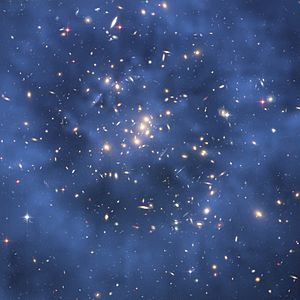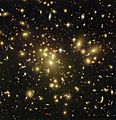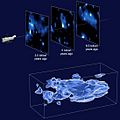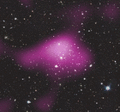Dark matter facts for kids
Dark matter is a mysterious type of matter that scientists believe makes up a huge part of the mass in our universe. We can't see it directly, but we know it's there because of how it affects things we can see through gravity.
Scientists first thought about dark matter when they noticed that big space objects, like galaxies, had much more gravity than they should based on the visible stuff like stars, gas, and dust. It was like something extra was pulling things, but we couldn't see what it was.
Contents
What is Dark Matter?
Dark matter is a type of matter that doesn't seem to give off or reflect any light or other types of radiation. This means our usual tools, like telescopes, can't find it. It's not made of the same particles as the things we see every day, like rocks, trees, or even ourselves.
The only way we can tell dark matter is around is by its gravitational pull. It acts like an invisible glue, holding galaxies and galaxy clusters together.
Why Do Scientists Believe in Dark Matter?
Scientists have several reasons to think dark matter exists:
- Galaxy Spin: Jan Oort first suggested dark matter in 1932. He noticed that stars in the Milky Way galaxy were spinning much faster than expected. It seemed like there was extra, unseen mass pulling them along.
- Galaxy Clusters: In 1933, Fritz Zwicky saw that galaxy clusters also had more mass than visible. They were spinning too fast to stay together without some extra gravity.
- Bending Light: Dark matter can bend the light from objects behind it. This is called gravitational lensing. When we see strange, stretched images of distant galaxies, it suggests there's a lot of unseen mass bending their light.
- Hot Gas in Clusters: The way hot gas is spread out in galaxy clusters also points to dark matter. The gas is much hotter and more spread out than it should be if only visible matter were present.
How Much Dark Matter is There?
According to the Planck mission team, which studies the universe, dark matter makes up about 27% of the total "stuff" in the universe. For comparison, the ordinary matter we can see (like stars and planets) is only about 5%. The rest is something called dark energy. This means dark matter is a huge part of our universe, even though we can't see it!
Finding Dark Matter
Because dark matter is so different from normal matter, it's hard to find. But scientists are always looking for new ways.
In 2006, a group of scientists found some interesting clues. They looked at two galaxy clusters that had crashed into each other at very high speeds. They expected that after the crash, the normal matter (like hot gas) would be scattered around. But the dark matter, being different, might behave differently.
By measuring the gravity in the crash area, they found two big clouds of dark matter. These clouds were separate from the cloud of normal matter (hot gas) that was in between them. This observation was a strong hint that dark matter is real and behaves in a unique way.
Related pages
Images for kids
-
Strong gravitational lensing seen by the Hubble Space Telescope in Abell 1689 shows dark matter is there. Enlarge the image to see the lensing arcs.
-
A 3-D map showing where dark matter is found, made using measurements from the Hubble Space Telescope.
-
A dark matter map from the Cosmic Evolution Survey (COSMOS) using the Hubble Space Telescope (2007).
-
A dark matter map from the Hyper Suprime-Cam Survey (HSCS) using the Subaru Telescope (2018).
See also
 In Spanish: Materia oscura para niños
In Spanish: Materia oscura para niños
 | Precious Adams |
 | Lauren Anderson |
 | Janet Collins |










